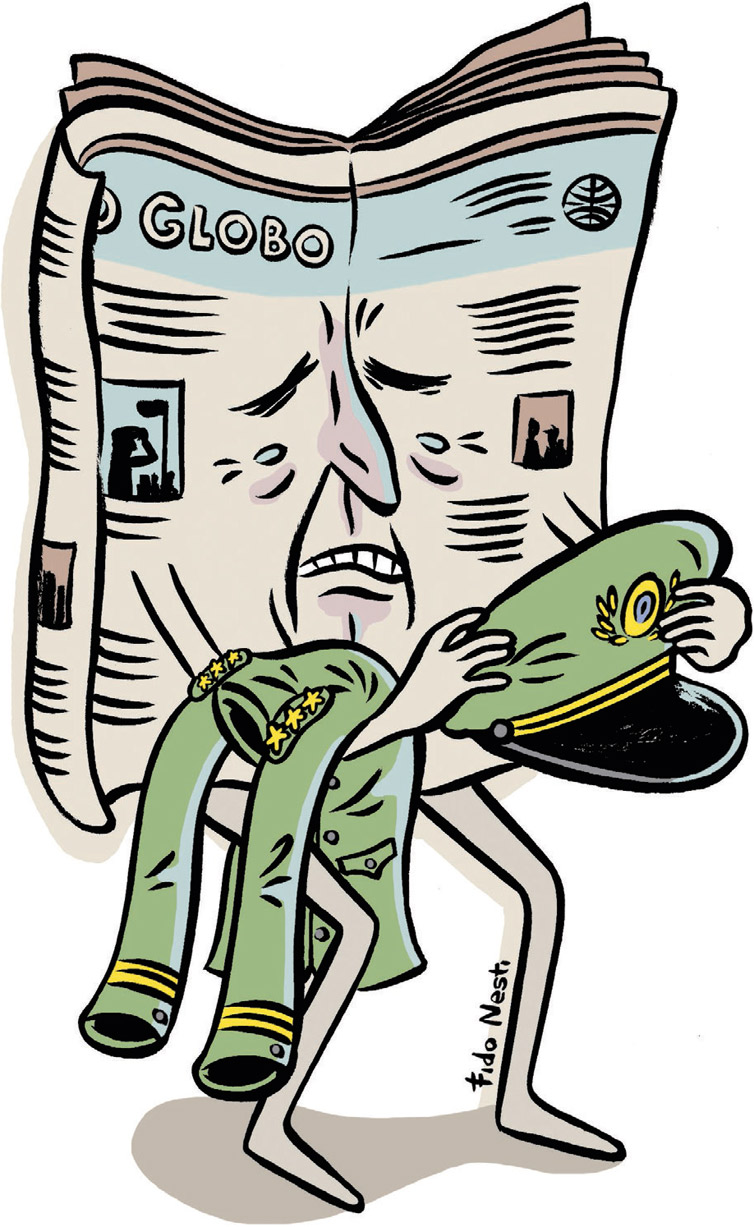Latest Photo Galleries
Brazilian Markets
17h36 Bovespa |
-0,17% | 124.171 |
16h43 Gold |
0,00% | 117 |
16h59 Dollar |
-0,48% | 5,2424 |
16h30 Euro |
+0,49% | 2,65250 |
ADVERTISING
Ghosts from the Past
09/09/2013 - 12h22
Advertising
SUZANA SINGER
ombudsman@uol.com.br
Facing shouts of 'The truth is hard, Globo supported the dictatorship!' which were heard in street protests, the expected reaction was that a big news organization would: 1) ignore the provocation; 2) deny it; 3) try to justify it.
Last Sunday, the Globo Organizations surprised by not doing any of those things. The newspaper O Globe published an editorial in which it recognized the support given to the military coup in 1964 was a mistake.
In fact, it is the truth and, furthermore, it s a hard truth, admitted the newspaper. The editorial cited the context of the era the Cold War, radicalization of President João Goulart' s government and the promise by the military that it would be a temporary intervention to justify the support given to the coup, described for a long time as a revolution.
O Globo made a point of underscoring that, in agreeing with the military intervention, it was on the side of other big newspapers, such as O Estado de São Paulo, Folha, the Rio daily Jornal do Brasil, and the extinct Rio daily Correio da Manhã. In fact, among the major newspapers, only the national daily Útima Hora, published by Samuel Wainer, sided with João Goulart.
It's just that Globo gave its support to the dictatorship until nearly the end, which the newspaper admits, while noting that it always demanded... the reestablishment, in the shortest time possible, of democratic normalcy.
"O Globo has no doubts that the support in 1964 seemed to those who ran the newspaper and lived at that time with a certain attitude, were aiming for what was good for the country. In the light of history, however, there is no reason to not recognize today, explicitly, that the support was a mistake, as were other editorial decisions in that period which resulted from that original mistake", said the text released on the Internet and TV.
It's the first time we have seen this scale of an act of contrition by the Brazilian press. This is the main media conglomerate admitting a mistake in an editorial - not of information- about a decisive moment in the country s recent history.
Globo attempted something similar by including in the book "The Nightly News, News Makes History" (2004) assessments seeking to refute two accusations which weight heavily on the newspaper: poor coverage of the protests to restore direct presidential election and that it favored Fernando Collor in the edition about the presidential debate with Luiz Inácio Lula da Silva in 1989.
The difference is that in these cases there were more explanations aimed at getting away from attributions of bad faith than the admission of errors in a tone much different from the one it is showing now.
Folha, the newspaper most open to criticism, is the only one among the major newspapers that has an ombudsman, but has never done anything like this.
On the occasion of the controversy about the term 'ditabranda' (dictatorship lite) in 2009, it published only a note in which it said that the use of the expression in an editorial was a mistake. The term has a frivolous connotation which does not acknowledge the seriousness of the topic. All dictatorships are equally abominable, said the note whose headline, Folha recognizes the mistake but reiterates criticism, shows that the newspaper was making a half-hearted and reluctant correction.
The thunderous global mea-culpa, which occupied almost three minutes on the nightly news, was driven by the protests in June. The text which introduced the editorial 1964 assumes this, in saying that the government and institutions, in some way, must respond to the clamor in the streets.
It's not so important if there are other interests in this self-criticism, done on the eve of the 50-year anniversary of the coup, or if there was much more to be said. The main thing is to realize whether this gives satisfaction to the public, which today, thanks to social media, has the unprecedented ability of expression and pressure.
It s a first step on the long road toward transparency, which shows respect for the other side, by the obsession with balance, by the rapid recognition of mistakes committed, and with channels that allow constant criticism.
Who knows if "the future has already started", as the year-end slogan by the network goes.
Translated by JOHN WRIGHT
Read the article in the original language
| Fido Nesti | ||
 |
||
| Ombudsman |



